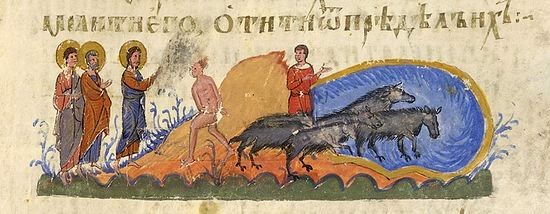Section 56
JESUS HEALS TWO GERGESENE DEMONIACS
Gergesa, now called Khersa
MATT. 8:28-34, 9:1
MARK 5:1-21
LUKE 8:26-40
Re location of town:
"Jesus and His disciples went to the east side of the lake (Sea of Galilee) into the region of the Gerasenes. Greek manuscripts are divided on the precise location involved, citing three names: Gadarenes (Mat_8:28), Gergesenes (from Origen), and Gerasenes.... Reliable evidence favors the name Gerasenes which probably referred to the small town Gersa (modern Khersa) located on the lake’s eastern shore. Most of its inhabitants were Gentiles (cf. Mar_5:11, Mar_5:19)." -BKC
"The country of the Gadarenes (ten chōran tōn Gadarēnōn). This is the correct text in Matthew while in Mar_5:1 and Luk_8:26 it is “the country of the Gerasenes.” Dr. Thomson discovered by the lake the ruins of Khersa (Gerasa). This village is in the district of the city of Gadara some miles southeastward so that it can be called after Gerasa or Gadara. So Matthew speaks of “two demoniacs” while Mark and Luke mention only one, the leading one." -RWP
Three accounts of this episode:
In Mark and Luke there is one man. In Matthew, there are two. All accounts have the man/men seeking out Jesus, although in Mark and Luke, the man falls before him. Mark and Luke's accounts are very similar, sharing that the man's name is "legion" which means many. Is this similar to a multiple personality disorder? Mark's account is the most different of the three.
Here are some of my initial questions and biases approaching this passage along with some of the commentator's "answers:"
1) Why did Jesus send the evil spirits into the pigs? (It strikes me as unnecessarily unfair to the pigs.) Could he not just cast the demons out of the men and into the spiritual realm?
"For what end was this request? Was it simply the way they chose to enter the abyss by? We know that the lives of the creatures, after the permission was given, lasted but a few minutes at most. Was it a desire to do more mischief during their brief sojourn on earth? Theophylact (eighth century) suggests that the purpose of the evil spirits, in their request, was to injure Jesus in that part of the country by arousing fears among the covetous inhabitants lest they too might lose, in a similar way, their herds. But to the writer of this note it seems best to confess that no satisfactory answer can ever be given here. We know so little of these dread spirits of evil. The reason of the Lord’s permission is more obvious. Some such visible proof as the sight of the evil and unclean forces that had mastered him so long, transferred to the bodies of other creatures and working their wild will upon them, was probably a necessary element in his perfect cure. It is likely also that Jesus wished to show his indignation at the flagrant disregard of the Mosaic Law, at the open disobedience to the Divine injunctions respecting swine, which was shown by the presence of so vast a herd of these animals pronounced unclean by the Mosaic Law under which these people were professedly living. In this district the large majority of the inhabitants were Jews. The keeping or the rearing of swine was strictly forbidden by the Jewish canon law. Other Oriental peoples also held these animals as unclean. Herodotus (it. 47) tells us that in Egypt there was a special class of swineherds, who alone among the inhabitants of the country were forbidden to enter a temple. This degraded caste were only allowed to marry among themselves. The eating of swine’s flesh is referred to by Isaiah (Isa_65:3, Isa_65:4) as among the acts of the people which continually provoked the Lord to anger." --Pulpit Commentary
The Pulpit Commentary raises two possible reasons:
A) the swine themselves are regarded as unclean by the Jews.
B) driving demons into swine provided visible proof of the miracle
Robertson's Word Pictures adds a third:
"The incidental destruction of the hogs need not trouble us when we are so familiar with nature’s tragedies which we cannot comprehend." -RWP
2) Do demons exist in people today who struggle with mental illness? Is "demon possession" the same as mental illness----a physiological condition or a spiritual condition? Can it be both? Or is it just one or the other? How do we differentiate between a physical imbalance and a spiritual imbalance? Are they intertwined sometimes, never, or always?
My sense, after reading through the commentaries and other reliable Christian sources on the web is that demon possession and mental illness are two distinct things. However, I think that being mentally ill makes you more vulnerable, in a sense, to both emotional and spiritual waves--whether bad or good. This is my take on it...not strictly Biblical.
Torment (βασαμίσῃς)
See on Mat_4:24. Luke never uses the word of sickness, as Mat_8:6. See on Luk_4:41. -VWS
So...does Luke then distinguish that demon possession is NOT a medical condition, only a spiritual one?
"Compare Mat_14:36; Mar_6:56, where διεσώθησαν, were thoroughly saved, and ἐσώζοντο, were saved, are used. Luke is more technical, using the strictly medical term, which occurs twenty-eight times in the New Testament, seventeen of these in Luke. Luke also uses the two words employed by Matthew and Mark, but always with some addition showing the nature of the saving. Thus Luk_7:3, where διασώσῃ (A. V., heal) is explained by Luk_7:7, ἰαθήσεται, the technical word, shall be healed, and by Luk_7:10, “found the servant whole (ὑγιαίνοντα, another professional word - see on Luk_5:31) that had been sick.” Compare, also, Luk_8:35, Luk_8:36, Luk_8:44, Luk_8:47, Luk_8:48. Medical writers do not use σώζειν or διασώζειν, to save, as equivalent to ἰᾶσθαι, to heal, but in the sense of escaping from a severe illness or from some calamity. Luke employs it in this sense - Act_27:44; Act_28:1." -VWS
I'm intrigued that Luke may help differentiate this issue of mental illness vs. demon possession because as a medical doctor he had greater knowledge of and was more specific with his terms. I'm not certain exactly what this comment above hints at except that Luke differentiated between physical sickness and spiritual sickness.
It had seized (συνηρπάκει)
Used by Luke only. See Act_6:12; Act_27:15. The verb literally means to snatch and carry away with (σύν). -VWS
Mark 5:5 seems to indirectly teach cutting oneself is a sign of evil/imbalance
I love the full circle account in Mark--that the man longed to stay with Jesus, but that he followed his directives to tell how much Jesus had done for him:
"
As he was getting into the boat, the man who had been possessed with demons begged him that he might be with him. And he did not permit him but said to him, “Go home to your friends and tell them how much the Lord has done for you, and how he has had mercy on you.” And he went away and began to proclaim in the Decapolis how much Jesus had done for him, and everyone marveled. -Mark 5:18-20
Interesting point:
For he was commanding the unclean spirit to
come out from the man. "The demons showed the
supremacy of Jesus not only by their cries to be let alone,
but by the fact that they made no effort to escape from him.
They ran to him, knowing that it was useless to do
otherwise." -Fourfold
And they entreated him that he would not [345]
command them to depart into the abyss. [The abyss or
bottomless pit was the proper abode of the demons. It is
mentioned nine times in Scripture: here and at Rom. 10:7;
Rev. 9:1, 2, 11; 11:7; 17:8; 10:1, 3. How these demons
escaped from the abyss is one of the unsolved mysteries of
the spirit world; but we have a parallel in the releasing of
Satan--Rev. 20:1-3.]
"The abyss was also thought of as a “watery place,” which made the outcome of this encounter all the more ironic and climactic." -BKC
"This was the first recorded witness of Jesus in a Gentile area." -BKC
"Hopefully, we too will find ourselves sharing with people the great things God has done for us. The storms are stilled by faith. The devil is defeated through faith. Faith is the key." -Jon Courson
"What have I to do with thee? (τί ἐμοὶ καὶ σοὶ)
Lit., what is there to me and thee ? What have we in common?"
-Vincent's Word Studies
I adjure thee by God
Stronger than Luke's I pray thee. The verb ὁρκίζω, I adjure, is condemned by the grammarians as inelegant. -VWS
The deep (ἄβυσσον)
Lit., the bottomless. Transcribed into our abyss, as Rev. Mark has a quite different request, that he would not send them out of the country (Mar_5:10). In Rom_10:7, used of Hades, to which Christ descended; and in Revelation always of the bottomless pit. The demons refer to their place of abode and torment. -VWS
"
And he besought him much that he would not send them away out of the country;" apparently here partly conscious of his own personal being, and partly identifying himself with the demoniac forces which were afflicting him. The request is a strange one, and suggests much anxious thought. What is the abyss these rebel-spirits dreaded with so great a dread? It would seem as though, to use Godet’s thought, that for beings alienated from God, the power of acting on the world is a temporary solace to their unrest, and that to be deprived of this power is for them just what a return to prison is for the captive.
St. Mark’s expression here is a curious one. He represents the spirits requesting Jesus "not to send them away out of the country." The two accounts put together tell us that these spirits were aware, if they were driven out of the country—whatever that expression signified, this earth possibly—they must go out into the deep, the abyss, what is called "the bottomless pit" in Rev_9:1, Rev_9:2, Rev_9:11. Any doom seemed to these lost ones preferable to that. The whole train of thought suggested by the incident and the words of the Lord is very terrible. We see at least one reason why the first preachers of the Word have selected this exorcism. It indeed lifts a bit of the curtain which hangs between us and the night of endless woe!
Helpful in thinking through why Christ would choose to send the spirits into the pigs:
And there was there an herd of many swine feeding on the mountain: and they besought him that he would suffer them to enter into them. And he suffered them.
On the death of the hogs:
I find it sobering that prophesy and casting out demons in Christ's name are listed here as acts of dis-genuine outward religion:
"On that day many will say to me, ‘Lord, Lord, did we not prophesy in your name, and cast out demons in your name, and do many mighty works in your name?’ And then will I declare to them, ‘I never knew you; depart from me, you workers of lawlessness.’" -Matthew 7:22-23
THE SELF-DECEPTION OF THE FLUENT SPEAKER. "Have we not prophesied in thy Name?" Reference may be made, not merely to glib and easy public speaking, but also to glib and easy expression in prayer; and in the utterance of religious feelings and experiences. Strange is the power of self-deception in these things. Because we can express, we feel sure we must feel. Because we can express earnestly, we satisfy ourselves that we must be feeling deeply. It costs great heart-searching, and continuous watchfulness, if our speech is made and kept strictly sincere. And it will soon be found that the talker is too often a mere talker.- pulpit
Notice that many will say, "Did not we prophesy?" Always be wary of people who promote themselves in ministry. Whenever I hear a ministry say, "Look what we are doing," bells ring, and red flags go up in my mind because Jesus taught humility and secrecy -Courson
The moment our Saviour came into the presence of this man he brought a distributing force. Two spheres came together that were antagonistic. Evil claims its rights, liberty. This is the keynote of the opposition in modern society to every attempt to make men better. BB
We should oppose these malign influences front self-interest, and in self-defence. It is not going away from our own affairs when we attempt to break down everything that is destroying the industry and virtue of society. We are bound to meddle with the demonized part of society. Men ought to stand on the ground of goodness and assert the dignity of rectitude over immorality. (Beecher.)



















